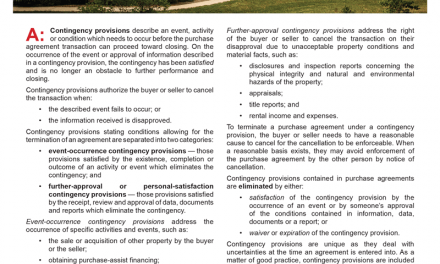Form-of-the-Week: Verification of Capacity to Represent Addendum – Form 252
Authority to bind a transaction participant
When a broker and their agent represent a client for the sale, lease/management or financing of real estate, it is common for a participant in a transaction to be:
- an entity, such as a limited liability company (LLC), partnership or corporation;
- a trust;
- an estate, conservatorship or guardianship; or
- an attorney-in-fact acting under a power of attorney. [See RPI Form 447]
Individuals acting on behalf of these participants to bind them to agreements in transactions are:
- investors or syndicators controlling an entity;
- a trustee holding title to property in trust;
- an executor or administrator appointed by a court to manage property; or
- an individual authorized to act under a power of attorney. [See RPI Form 447]
When an agent represents participants in a transaction which are to become bound to agreements by the signature of a separate individual, it is important the agent verifies:
- the entity was formed and is in good standing with the state;
- the trust, estate or guardianship was properly established; and
- the individual signing on behalf of a participant has the authority to do so.
Further, the individual who enters into an agreement on behalf of a participant needs to provide documentation which confirms their representative capacity, along with a completed Verification of Capacity to Represent Addendum to be attached to the agreement. [See RPI Form 252]
Supporting documentation provided by the authorized individual includes:
- an LLC operating agreement or partnership agreement [See RPI Form 372];
- a corporate resolution;
- a declaration of trust;
- a court document appointing an executor or administrator; or
- a power of attorney. [See RPI Form 447]
The Verification of Capacity to Represent Addendum — published by RPI (Realty Publications, Inc.) — is used by an agent when a participant entering into an agreement is an entity, trust, estate or guardianship, or has granted a power of attorney, to establish the identity of the participant in the transaction and verify the authority of the individual signing the agreement to bind the participant. [See RPI Form 252]
Verification of the individual’s authority by the agent establishes the individual signing an agreement on behalf of a participant is the agent of the participant and is not personally liable for performance of the agreement entered into by their signature.















